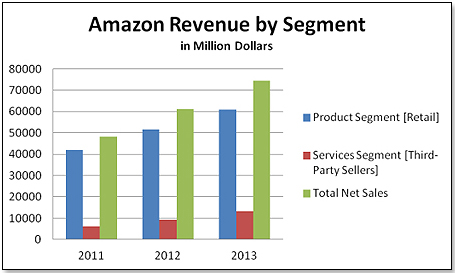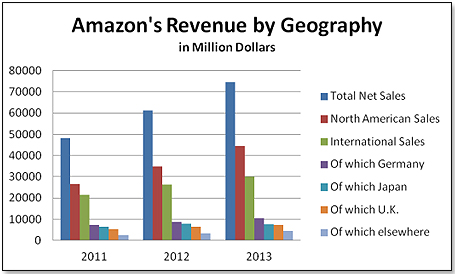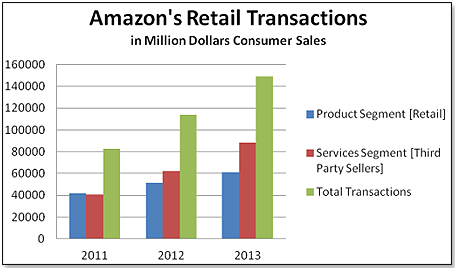 |

Tools:








Alibaba – where is the company today and where is it going?
Now that the Alibaba IPO – arguably the largest in history – has been accomplished, two crucial questions remain unanswered: Why did Jack Ma do it in the first place and where is he going from here?
The first factor to understand is that Alibaba and all its operations are facilitators. They do not own stores nor do they sell online or otherwise themselves. They make money by letting people transact business via Alibaba websites.
We should first have a look at what the Alibaba empire really looks like today. It has seven parts:
| Entity |
Does what |
Annual Consumer or Retail Transactions |
U.S. Competitor |
| Aliexpress |
Sells small quantities to Businesses at wholesale prices |
$10 Billion |
None |
| Alipay |
Online Payment Platform |
$623 Billion in 2013 |
EBay (PayPal) |
| Cainiao |
Provides fulfillment throughout China |
$ 15 Billion |
None |
| Juhasuan |
Offprice product offerings business-to-business |
$10 Billion |
None |
| Taobao |
Allows private persons and small businesses to sell merchandise to customers |
$177 Billion |
None |
| TMall |
Similar to Amazon where companies can offer merchandise to consumers |
$70 Billion |
Amazon/EBay |
| 1688 |
omestic Business-to-Business in China only |
$15 Billion |
None |
Alibaba with its several companies now controls more than 80% of all online sales in China with Amazon having a mere 2.7%. EBay is totally out of it since the company withdrew from the market in 2012. A similar picture applies to online payments where Alipay has a market share just shy of 50% whereas PayPal is estimated at around 4%. In other words, Alibaba owns the Chinese online market place.
However, this is about all the company owns right now. Its business outside China represents a mere 9% of the total and this mainly with overseas Chinese located in South East Asia and Taiwan. And with a 80% market share, you can no longer grow by grabbing business from competition. So you have to look elsewhere.
Jack Ma, the founder and leading light of Alibaba, very clearly stated his geographical objectives a few days ago:
"Speaking for Alibaba, we hope to become a global company, so after we go public in the U.S., we will expand strongly in Europe and America. At the same time we won't abandon Asia, because after all we're not a company from China, we are an Internet company that happens to be in China."
This may explain why Alibaba did its IPO in the first place. They clearly were under no outside pressure to do so since their current Chinese business is not only growing rapidly but is also extremely profitable. Their cash flow so generated would have guaranteed enough finance for any organic future growth. However, this is clearly not what is in Jack Ma's mind.
Alibaba has in fact several major growth opportunities – two in China and one in North American. The main Chinese opportunities are banking services through Alipay and online retail services similar to the Amazon model by leveraging Cainiao; and in the United States and Europe for online third party commerce similar to TMall. Any of the three needs lots of cash which Jack Ma – thanks to the IPO - now has in abundance.
Friends of mine at Amazon believe that Alibaba's first target is the U.S. The company has already taken steps to get there.
- In 2010, Alibaba acquired Auctiva Corporation, an eBay auction management system, founded in 1998 by Jeff Schlicht.
- Again in 2010, they bought Vendio Services Inc, an Internet software "as a service (SaaS)" Company that provides sales management software by subscription. A majority of customers use Vendio for its eBay auction management program and eBay applications. Vendio also owns and operates Dealio (Dealio.com delivers daily online coupon codes, discount coupons and online deals), Widgipedia (provides for the development and distribution of Web and desktop "widgets" across a growing number of widget development platforms). and Honesty.com (which is totally integrated with Vendio).
- In 2011, Alibaba bought Single Feed, a company that has been assisting online merchants to increase website traffic and conversions and is a leading source of information for the comparison shopping industry.
- In January 2014, Alibaba put $15 million into 1stDibs, a luxury e-commerce website linking dealers with interior designers and consumers for jewellery, couture and fine art.
- In March, 2014, it invested $217 million in messaging app Tango, taking a 20% stake in the company.
- Again in March 2014, it took a 39% share in the online shopping platform ShopRunner Inc. for $202 million. ShopRunner operates in a very similar fashion to Amazon Prime – membership, free shipping, exclusive deals – and has over 1 million members. Now exploring a JV with Alibaba to extend offering of major American brands to Chinese consumers
- In April 2014, Alibaba joined several companies and investment groups in giving U.S. ride-sharing service Lyft (a competitor to Uber) a $250 million cash infusion.
- In June 2014, Alibaba launched 11Main.com, an online marketplace that seeks to connect U.S. shoppers with owners of specialty shops and boutiques.
- In July 2014, Alibaba took a 10% stake of video game publisher Kabam for $120 million.
With the exception of Lyft and Kabam – which are probably standalone propositions in their own right – all others appear to be vehicles designed to give Alibaba insight into and expertise relative to the overall U.S. e-commerce market place. Executives at the various internet and brick-and-mortar retailers appear convinced of two things. One is that the final acquisition target is eBay and that the ultimate competitor is Amazon.
Why EBay as an acquisition target? EBay operates in the same way TMall does – it is a facilitator for companies to sell their goods to consumers online. It also owns PayPal which is equally similar to Alibaba's Alipay. Its business is in pretty equal parts in North American and Europe where Alibaba wants to establish itself. The company is profitable, has no major legal or labor problems, and is overall pretty clean. At a current market capitalization of $65 Billion, EBay's size is definitely not outside Alibaba's reach.
Why Amazon as the primary competitor?
The most important factor, of course, is that Amazon dominates the U.S. and West European online market place with EBay being a distant second.
Amazon has essentially two businesses – one being an online shopping mall for outside vendors selling to consumers, the other being an online retailer. The first is very similar to what Alibaba is doing with Taobao and TMall in China and is hence very much within Alibaba's core expertise. It is also a very attractive target as it is not only a significant part of Amazon's business but also one that is growing much faster than its retail arm.
This is how Amazon's business breaks out (in million U.S. Dollars):

and the Company's geographical revenue distribution:

Note that the numbers for the Product Segment show the total value of the merchandise sold whereas those for the Services Segment only show Amazon's income from the transactions, mainly commissions which on average amount to about 15% of the sales value.
However, if we look at total retail transactions by either Amazon or its outside vendors, the picture is different (again in million U.S. Dollars):

Amazon's third party business would appear to be the most obvious target for Alibaba since it is so closely aligned with Alibaba's core expertise. In addition, Amazon's third party business is growing much faster than its retail business and is now significantly larger. While Amazon's SEC filings do not break out profitability by segment, it is generally believed that the Service Segment is very much the more profitable of the two. It also has some very obvious vulnerable areas which make the Service Segment an attractive target for a determined competitor.
One is the service fees Amazon receives from third-party sellers, ranging from 14% to 40% of the purchase price, which, for the vendors, is a major bone of contention.
The second is the company's payment practices. There is the widespread allegation that the company unilaterally withholds payment or delays it to ninety days or even longer – a situation which led to a class-action lawsuit filed last year by online sellers who say that the company violates its own terms as well as Washington state law by holding the sellers' money for more than 90 days.
The third is widespread labor problems both in the U.S. and in its second largest market, Germany.
Amazon's geographical distribution of its Third Party business is another significant factor. Their total transaction volume of $ 66 billion is in exactly the places to which Alibaba wants to expand.
At the same time, Alibaba also has a few challenges to overcome in order to successfully conquer markets in the Western World.
The first challenge is that Alibaba will be playing in Amazon's sandbox. Amazon will do its utmost to thwart Alibaba from gaining a foothold in its own territory and they can try to do this by a variety of means. One is to play on the cultural bias; the second is to use a loss leader approach targeting major vendors; and the third and most potent is to use its lobbying muscle to impede Alibaba through political-legislative means. Of course, an acquisition of EBay would very much mitigate these factors.
The second challenge is the high incidence of fakes and knock-offs on the company's Chinese e-commerce sites, particularly Taobao. This has already led to court cases, notably a lawsuit filed on July 9 in the U.S. by Gucci, Yves Saint Laurent and other brands under Kering SA, alleging that Alibaba's shopping, marketing and payment platforms "knowingly make it possible for an army of counterfeiters to sell their illegal wares throughout the world, including the U.S., and are compensated by the counterfeiters." Two weeks after the lawsuit was filed, Kering withdrew its claims against Alibaba because of "constructive dialogue," both parties said in a joint statement.
It would be wise for Alibaba to make certain that its North American and European ventures avoid carrying products that open the door for very costly and damaging lawsuits – and there are plenty of law firms that would jump at the opportunity now that Alibaba is registered in the Cayman Islands and hence easier to sue than a Chinese company.
The third challenge is overcoming cultural differences. These come at Alibaba from two directions. One is from within the company. None of its senior executives and managers, and this includes Jack Ma, have really deep roots in the non-Asian world and hence will base their decisions instinctively on the premise that what holds true for China will also hold true for North America or Europe. This could be a challenge for the company since Asian managers, employees and consumers operate very differently from their Western counterparts.
The other is the image of China as perceived by the Western consumers. The phrase "Made in China" does not necessarily evoke connotations of ‘high-quality' and ‘reliability' among them in contrast to the way they think of products made in markets like Germany or Japan. This bias also colors the Western consumers' perception of Chinese companies.
A clue to Jack Ma's approach to these challenges could lie in his handling of the 11Main venture. All the vendors on 11Main.com, a collection of specialty retailers and boutiques, are American firms. 11Main's executives, too, are American. Even the name was selected to evoke the Main Street, U.S.A., shopping experience.
According to Mike Effle, 11Main president and general manager, "the site was created to give American businesses offering unusual or unique products a platform for selling directly to a wider U.S. customer base." Merchants on the site, "are generally small businesses that don't have a compelling way to tell their stories." 11Main attempts to fill that need by providing an online shopping destination that is designed to give consumers an entertaining place to browse for apparel, jewelry, home furnishings and other products, while providing merchants with high brand visibility—there are currently fewer than 2,000 shops on the site—and a chance to tell their stories through photos, text and video.
To become a vendor to 11Main requires an application which may, or may not, result in an invitation to join. In addition, 11Main is providing its vendors with a unique degree of marketing support. Prior to the debut, the site even sent a video team to some merchants to shoot company profiles for their storefront displays at no charge. The fact that 11Main is offering far better terms to its vendors also helps. 11Main charges shops $0.05 per product listing per month plus a 3.5% transaction fee which is capped at $50. This compares with almost 10% for eBay and about 15% for Amazon.
11Main also benefits from the fact that Alibaba acquired in 2010 the eBay listing tools Auctiva and Vendio, which gave it access to over 250,000 eBay sellers who were responsible for an estimated 5% to 10% of eBay's listings at the time. The 11Main site now taps Auctiva's technology to allow sellers to upload their existing eBay listings to 11Main. That direct tap into a major competitor, along with 11Main's targeted selection of vendors, will allow 11Main the means to differentiate itself from the likes of Amazon and EBay. In fact, 11Main should be fully conversant with the challenges of integrating Auctiva and Vendio since Auctiva founder and former CEO Jeff Schlicht is CEO of 11Main, and Mike Effle, President and General Manager of the company, used to be CEO of Vendio.
The 11Main business model is nearly the complete antithesis of the strategies followed by the world's largest online marketplaces – e.g. Amazon or EBay - which have low barriers to entry and can host tens of thousands of sellers who compete in a totally undifferentiated atmosphere largely on price. Whether 11MaIn represents the template Alibaba will follow when building their presence in North America. and Europe remains to be seen. What it does suggest, however, is that the company and its top executives are unlikely to blindly adopt either the ways in which they do business in China or the policies their main competitors are following in the United States.
Alibaba's main opportunity in the U.S. and Europe could well be the fact that it is a newcomer, not overly beholden to its outside shareholders, not on the quarterly earnings treadmill and with very little past baggage. The company is hence in a position to enter their new territory in the right way and to profit from the mistakes its competitors far and wide – from Amazon to EBay to Wal-Mart – are making. Jack Ma's central mantra "customers first, employees second, and shareholders third" – which he clearly follows in his policies for Alibaba in China - suggests a direction for Alibaba's venture into the Western world as well. Providing a superior service at competitive pricing, insisting on rigorous quality controls over outside vendors, paying decent wages and treating employees fairly would go a long way towards establishing Alibaba as a superior company – similar to the manner by which Costco is seen as superior to Wal-Mart. And just as in the case of Costco, the result would in all likelihood show up in the company's financial performance.
 Writer's Bio: Writer's Bio: Lutz Muller is a Swiss who has lived on five continents. In the United States, he was the CEO for four manufacturing companies, including two in the toy industry. Since 2002, he has provided competitive intelligence on the toy and video game market to manufacturers and financial institutions coast-to-coast. He gets his information from his retailer panel, from big-box buyers and his many friends in the industry. If anything happens, he is usually the first to know. Read more on his website at www.klosterstrading.com. Read more articles by this author
THIS BANNER IS AN AD:

Back to TDmonthly's front page
|  |
Advertise on TDmonthly

|

